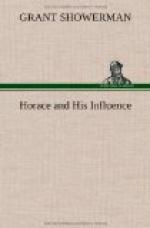The gracious touch and quiet humor with which Horace treats even the most serious themes are often misleading. This effect is the more possible by reason of the presence among his works of passages, not many and for the most part youthful, in which he is guilty of too great freedom.
Horace is really a serious person. He is even something of a preacher, a praiser of the time when he was a boy, a censor and corrector of his youngers. So far as popular definitions of Stoic and Epicurean are concerned, he is much more the former than the latter.
For Horace’s counsel is always for moderation, and sometimes for austerity. He is not a wine-bibber, and he is not a total abstainer. To be the latter on principle would never have occurred to him. The vine was the gift of God. Prefer nothing to it for planting in the mellow soil of Tibur, Varus; it is one of the compensations of life:
“I_ts magic power of wit can spread_
T_he halo round a dullard’s head_,
C_an make the sage forget his care_,
H_is bosom’s inmost thoughts unbare_,
A_nd drown his solemn-faced pretense_
B_eneath its blithesome influence_.
B_right hope it brings and vigor back_
T_o minds outworn upon the rack_,
A_nd puts such courage in the brain_
A_s makes the poor be men again_,
W_hom neither tyrants’ wrath affrights_,
N_or all their bristling satellites_.”
When wine is a curse, it is not so because of itself, but because of excess in its use. The cup was made for purposes of pleasure, but to quarrel over it,—leave that to barbarians! Take warning by the Thracians, and the Centaurs and Lapiths, never to overstep the bounds of moderation. Pleasure with after-taste of bitterness is not real pleasure. Pleasure purchased with pain is an evil.
Upon women he looks with the same philosophic calm as upon wine. Love, too, was to be regarded as one of the contributions to life’s pleasure. To dally with golden-haired Pyrrha, with Lyce, or with Glycera, the beauty more brilliant than Parian marble, was not in his eyes to be blamed in itself. What he felt no hesitation in committing to his poems for friends and the Emperor to read, they on their part felt as little hesitation in confessing to him. The fault of love lay not in itself, but in abuse. This is not said of adultery, which was always an offense because it disturbed the institution of marriage and rotted the foundation of society.
There is thus no inconsistency in the Horace of the love poems and the Horace of the Secular Hymn who petitions Our Lady Juno to prosper the decrees of the Senate encouraging the marriage relation and the rearing of families. Of the illicit love that looked to Roman women in the home, he emphatically declares his innocence, and against it directs the last and most powerful of the six Inaugural Odes; for this touched the family, and, through the family, the State. This, with neglect of religion, he classes together as the two great causes of national decay.




